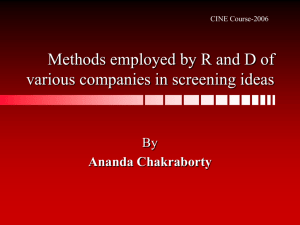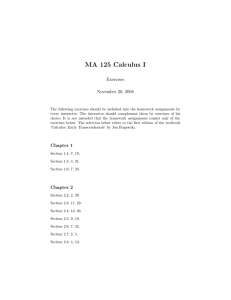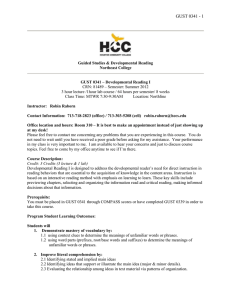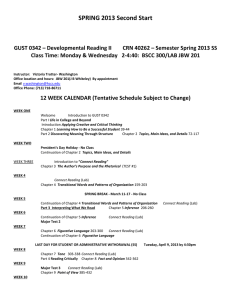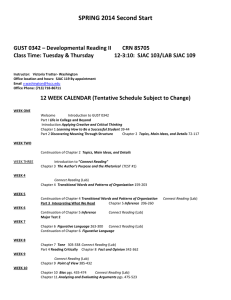SyllabusGUST0342.doc
advertisement
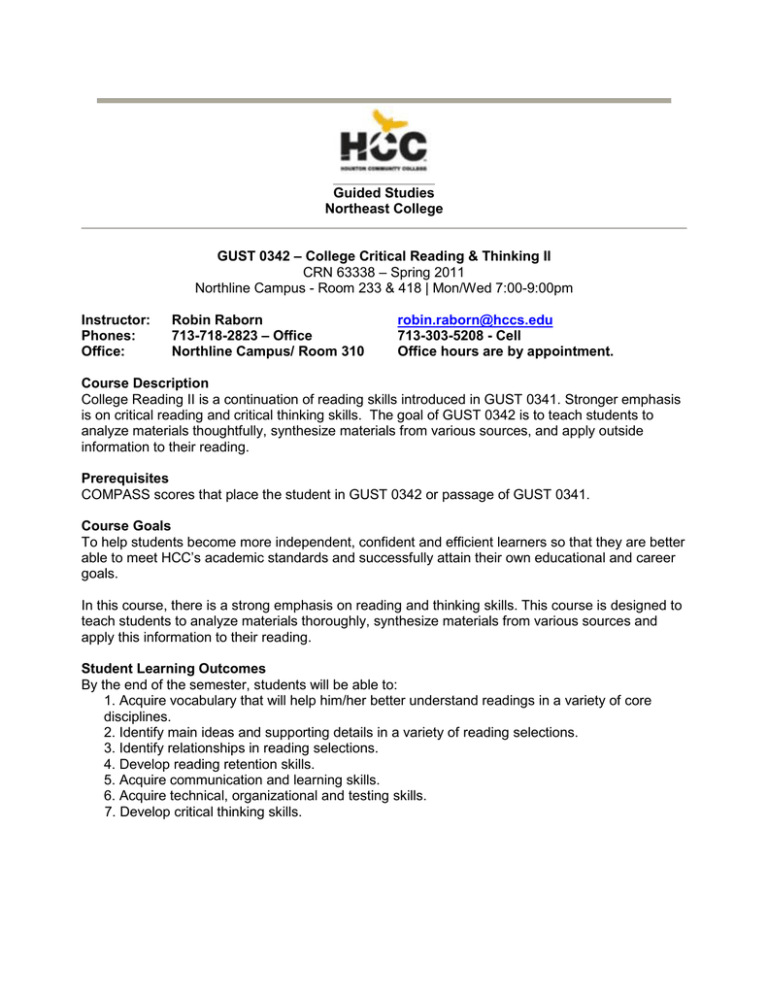
Guided Studies Northeast College GUST 0342 – College Critical Reading & Thinking II CRN 63338 – Spring 2011 Northline Campus - Room 233 & 418 | Mon/Wed 7:00-9:00pm Instructor: Phones: Office: Robin Raborn 713-718-2823 – Office Northline Campus/ Room 310 robin.raborn@hccs.edu 713-303-5208 - Cell Office hours are by appointment. Course Description College Reading II is a continuation of reading skills introduced in GUST 0341. Stronger emphasis is on critical reading and critical thinking skills. The goal of GUST 0342 is to teach students to analyze materials thoughtfully, synthesize materials from various sources, and apply outside information to their reading. Prerequisites COMPASS scores that place the student in GUST 0342 or passage of GUST 0341. Course Goals To help students become more independent, confident and efficient learners so that they are better able to meet HCC’s academic standards and successfully attain their own educational and career goals. In this course, there is a strong emphasis on reading and thinking skills. This course is designed to teach students to analyze materials thoroughly, synthesize materials from various sources and apply this information to their reading. Student Learning Outcomes By the end of the semester, students will be able to: 1. Acquire vocabulary that will help him/her better understand readings in a variety of core disciplines. 2. Identify main ideas and supporting details in a variety of reading selections. 3. Identify relationships in reading selections. 4. Develop reading retention skills. 5. Acquire communication and learning skills. 6. Acquire technical, organizational and testing skills. 7. Develop critical thinking skills. GUST 1270 – page 2 Learning Objectives Students will: 1.1. Apply context clues to determine the meaning of words and phrases. 1.2. Delineate the meaning of figurative language. 2.1. Show stated and implied main ideas and supporting details in written material. 2.2. Show a writer's purpose, intended audience, viewpoint, tone and intended meaning. 2.3 Describe the relationship of ideas in written material. 3.1. Show inferences. 3.2. Identify conclusions. 3.3. Describe various perspectives on an issue. 3.4. Acquire problem solving methods. 4.1. Determine assumptions underlying a writer's argument.. 4.2. Show the reasoning in a writer's argument. 4.3 Calculate the overall logic and credibility of a writer's argument. 4.4. Show fallacies. 5.1. Prepare outlines. 5.2. Acquire Note-taking skills. 5.3. Delineate visual aids. 5.4.Apply written directions. 5.5. Produce a summary of reading assignments. 5.6. Exhibit use of the college library for academic research. 6.1. Develop technological proficiency. 6.2. Organize information. 6.3. Prepare for and exhibit taking tests successfully 7.1. Draw an analysis of the relationship of ideas in written material. 7.2. Make inferences and generate conclusions. 7.3. Illustrate various perspectives on an issue. 7.4 Employ problem solving methods. 7.5. Determine assumptions underlying a writer’s argument. 7.6. Determine the overall logic and credibility of a writer’s argument. 7.7. Apply the overall logic and credibility of a writer’s argument. 7.8. Determine fallacies. SCANS or Core Curriculum Statement and Other Standards READING: Reading at the college level means the ability to analyze and interpret a variety of printed materials -- books, articles, and documents. A core curriculum should offer students the opportunity to master both general methods of analyzing printed materials and specific methods for analyzing the subject matter of individual disciplines. GUST 1270 – page 3 16 Week Class Calendar Week One (1/17-19) Holiday Review syllabus Week Two (1/24-26) Direction for MRL (sign up on your own) Chapter 1 – Active Learning Lab: MRL pre-assessment & Lexile indicator assessment Week Three (1/31-2/2) Finish MRL assessments if necessary Chapter 2 - Vocabulary Week Four (2/7-9) Lab: Start on MRL exercises – Vocabulary Quiz 1: Chaps 1 & 2 Chapter 3 – Strategic Reading & Study Week Five (2/14-16) Lab: MRL Exercises – Active Reading Strategies Chapter 4 – Main Idea Week Six (2/21-23) Holiday No class – Continue working on My Reading Lab (MRL) – Main Idea & Supporting Details Week Seven (2/28-3/1) Lab: MRL Exercises – Supporting Details Quiz 2: Chaps 3 & 4 Chapter 5 – Patterns of Organization Week Eight (3/7-9) Review for Midterm Midterm Spring Break – (3/14-18) Week Nine (3/21-23) Problem Solving Week Ten (3/28-30) Lab: MRL Exercises – Patterns of Organization Chapter 6 – Organizing Textbook Information Week Eleven (4/4-6) Lab: MRL Exercises – Reading Textbooks Chapter 7- Inferences Week Twelve (4/11-13) Lab: MRL Exercises – Inferences Quiz 3: Chaps 6 & 7 Chapter 8 – Point of View Week Thirteen (4/18-20) Lab: MRL Exercises – Purpose & Tone Chapter 9- Critical Thinking Week Fourteen (4/25-27) Lab: Finish MRL Exercises – Critical Thinking Chapter 10 – Graphic Illustrations Week Fifteen (5/2-4) Present Debate Projects Week Sixteen (5/11) Final Exam @ 7:30PM - - (You must take the final exam to pass the course) ***All dates and assignments are subject to change. GUST 1270 – page 4 Instructional Methods Because learning requires active (not passive) involvement on the part of the learner, you must come to class prepared. This includes being ready to discuss or otherwise work with all readings and other materials assigned prior to class. Minimum preparation is taking notes and thinking about personal application of the text material. Though I lecture when appropriate, you can expect to be involved in class and group discussions, other collaborative work, individual participation activities, internet research and computer centered learning through an online program called My Reading Lab. Student Assignments Quizzes – There will be a total of 3 quizzes given throughout the semester over information covered in the textbooks and handouts. Your post-assessment grade from My Reading Lab will count as an additional 2 quiz grades. Mid-term and Final Exams – Students are required to take the final exam in this course. They will receive a failing grade in the class even if their average is above 70 if they miss the final exam. Class Assignments – You will receive reading worksheets that must be complete at the beginning of the class period on the day they are due. It is essential that you complete reading assignments BEFORE the classes in which they are to be discussed or else you will not be able to contribute to the class and will lose participation points. There will be several written assignments on a variety of topics. My Reading Lab (MRL) – There is one hour of lab time schedule each week as part of the class, but completion of MRL will require work outside of class. You may access MRL anywhere you can sign on to the Internet. In order to get credit for each MRL segment, you must complete 2 practice exercises and 1 test and make a 70 or above on at least one of the two exercises and on the test. You will be allowed to re-take an exercise or test if necessary. Students will be given a pre-assessment during the second week of class to determine their beginning reading level in the course. The pre-assessment will not be graded. An MRL code for access to the online program is bundled with course textbooks. A graded post-assessment will be given at the end of the semester to measure progress made during the course. The postassessment counts as two quiz grades. Debate Project – At the end of the semester, students will participate in debates over current controversial topics. There will be both a written component and an oral presentation. Students will be broken into groups of 4. Any student who does not show up for the presentation on the date scheduled or does not participate in the debate will receive a grade of zero. Assessments Quizzes Midterm Final Exam 15% 10% 10% Homework & In-Class Assignments My Reading Lab Debate Project Instructional Materials Bridging the Gap, 10th ed., Brenda Smith & LeeAnn Morris My Reading Lab passkey for online access 20% 30% 15% GUST 1270 – page 5 HCC Policy - ADA Services to Students with Disabilities The Houston Community College System is committed to compliance with the Americans with Disabilities Act (ADA) and the Rehabilitation Act of 1973 (Section 504). Any student with a documented disability (e.g. physical, medical, learning, psychiatric, developmental, vision, hearing, etc.) who needs to arrange reasonable accommodations must contact the Disability Support Services (DSS)/ADA Counselor at the beginning of each semester. Faculty members are authorized to provide only the accommodations requested by the DSS Office. Dr. Kim Ingram is Northeast College’s DSS / ADA Counselor. Her telephone number is (713) 718-8420. For other questions, you may also contact Donna Price at (713) 718-5165 or visit the ADA Website at http://www.hccs.edu/students/disability/index.htm HCC Policy - Class Attendance Realizing that student success in college is largely dependent on attending class, it is imperative that you make an effort to attend every class. There is no such thing as an excused absence. On certain occasions, circumstances may arise such as sickness, family issues, childcare, hospitalization and unavoidable transportation problems. Because of this, students are allowed to miss 12.5% or 4 class periods. Students missing more than that time will be dropped from the course. I strongly suggest that you schedule your appointments at times that do not interfere with your attendance in this class. You are expected to attend both lecture and lab regularly. If you are tardy by over 15 minutes or leave class early more than three times, it will count as one full absence. You are responsible for obtaining materials covered during your absences. HCC Policy - Withdrawals If you feel that you cannot complete this course, you will need to withdraw from the course prior to April 14,, 2010 at 4:30pm. If you do not withdraw before the deadline, you will receive the grade that you are making in the class as your final grade. Before, you withdraw from your course; please take the time to meet with the instructor to discuss why you feel it is necessary to do so. The instructor may be able to provide you with suggestions that would enable you to complete the course. Beginning in fall 2007, the Texas Legislature passed a law limiting first time entering freshmen to no more than SIX total course withdrawals throughout their educational career in obtaining a certificate and/or degree. HCC Policy - Repeat Course Fee The State of Texas encourages students to complete college without having to repeat failed classes. To increase student success, students who repeat the same course more than twice, are required to pay extra tuition. Effective fall 2006, HCC will charge a higher tuition rate to students registering the third or subsequent time for a course Classroom Behavior As your instructor and as a student in this class, it is our shared responsibility to develop and maintain a positive learning environment for everyone. I take this responsibility very seriously and will inform members of the class if their behavior makes it difficult for anyone to carry out this task. As a fellow learner, you are asked to respect the learning needs of your classmates and assist me in achieving this critical goal. To show respect to your fellow students and instructor, you will turn off your phone and other electronic devices, and will not use these devices in the classroom unless you receive permission from the instructor. GUST 1270 – page 6 HCC Policy - Academic Honesty A student who is academically dishonest is, by definition, not showing that the coursework has been learned, and that student is claiming an advantage not available to other students. You are expected to be familiar with the College’s Policy on Academic Honesty, found online in the catalog and student handbook. What that means is: If you are charged with an offense, pleading ignorance of the rules will not help you. Penalties and/or disciplinary proceedings may be initiated by College System officials against a student accused of scholastic dishonesty. “Scholastic dishonesty”: includes, but is not limited to, cheating on a test, plagiarism, and collusion. Use of Camera and/or Recording Devices As a student active in the learning community of this course, it is your responsibility to be respectful of the learning atmosphere in your classroom. To show respect of your fellow students and instructor, you will turn off your phone and other electronic devices, and will not use these devices in the classroom unless you receive permission from the instructor. Use of recording devices, including camera phones and tape recorders, is prohibited in classrooms, laboratories, faculty offices, and other locations where instruction, tutoring, or testing occurs. Students with disabilities who need to use a recording device as a reasonable accommodation should contact the Office for Students with Disabilities for information regarding reasonable accommodations Grading Your instructor will conduct quizzes, exams, and assessments that you can use to determine how successful you are at achieving the course learning outcomes (mastery of course content and skills) outlined in the syllabus. If you find you are not mastering the material and skills, you are encouraged to reflect on how you study and prepare for each class. Your instructor welcomes a dialogue on what you discover and may be able to assist you in finding resources on campus that will improve your performance. Grading Scale 90 - 100 = A 80 - 89 = B 70 - 79 = C 60 - 69 = D Below 60 = F Grading Percentages Quizzes Midterm Final Exam 15% 10% 10% Homework & In-Class Assignments My Reading Lab Debate Project 20% 30% 15%
